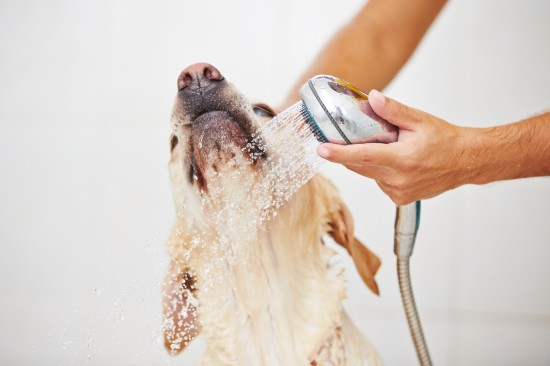
A dog allergy is not always easy to diagnose in your pet, although you might sense that something is wrong. Most of us who have a dog as a pet, or more as a family member than a pet, can generally tell when something's not right, although it is very difficult to diagnose illnesses in dogs and we generally end up taking them to a vet.
So how can you tell when a dog is allergic to something, and what can you do to prevent it? The first thing you should not do is to ignore the problem, but neither should you immediately rush to the vet. Dogs are sensitive to a wide range of external irritants, just as humans are, and they sneeze and scratch just the same as we do. If you see your dog constantly scratching, sneezing or rubbing itself on the carpet, you should check it out because this is abnormal behavior for a healthy dog and must be investigated.
Flea and Mite Allergies
If you check the apparently irritating area, you might spot some hair loss, redness of the skin, perhaps mites or flea debris. Mites in particular will require veterinary treatment, and while you might be lucky and realize that this behavior coincides with you using a new fabric conditioner on the dog blanket, the cause of a dog allergy is often not obvious.
Dogs can be sensitive to contact allergens such as detergents and airborne allergens, but redness and particularly behavior such as chewing the skin or rubbing parts of its body along the ground, are frequently indications of flea infestations. Many dog allergies are caused by fleas, and not just because of the 'bite'.
In fact, it is not so much the flea itself that causes the dog allergy but the flea's saliva - this itches the dog's skin, and the dog then scratches, leading to hair loss and redness of the skin. The skin will then be sensitive to bacterial contamination, and small pustules can form - all because of the saliva of a small flea! If you spot fleas, then a good warm bath with an anti-flea shampoo can often help. You should then follow up with a good contact flea treatment such as Frontline to remove the fleas and prevent the eggs reinfesting when hatched.
Dog Allergy - Food
Mites should be dealt with by a vet because of the danger of leaving the head inside the skin when you try to remove them. That in itself could continue the allergic reaction. However, it is not only contact allergens to which dogs are sensitive: many dogs also suffer food allergies. Dog allergy symptoms such as skin irritation, itching and hair loss can be caused by an allergy to food, and it's sometimes difficult to tell the difference between a dog food allergy and a contact allergy.
However, if your dog is also sick, or has loose stools, and onset of the behavior may have coincided with a change of food, then perhaps these new cheaper biscuits you have found are the problem, or maybe he has been helping himself to the neighbor's cat food (hopefully not the neighbor's cat!).
The solution here should be simple: change the food. It would sensible to return to whatever the dog has been eating until recently, and then evaluating its recovery. You might also try a complete change of food, or even try feeding your dog what you eat for a while. If the problem eventually goes, then you have found the culprit, but if not then perhaps a visit to the vet is called for.
Airborne Dog Allergies
If your pet is sneezing as well as scratching, then the problem is likely airborne. Dogs can get hay fever just like we humans, and the time of year might give you a clue. This seems to occur more in female dogs than males. A dog allergy can also be caused by house dust - dust mites, for example, or even cat hairs or human hair. You might solve the problem with good vacuuming of all the carpets and the animal's bedding.
That's something many dog owners forget - the bedding, and the poor creature may be lying in a veritable hotchpotch of dust mites, old flea residues and all sorts of hairy detritus. It's enough to make any dog itch! Your dog might also show allergy symptoms if he detects stress in you, and if you are having a hard time at the moment your dog will sense it.
It is sometimes extremely difficult to get to the bottom of a dog allergy, but if you spot this type of abnormal behavior it is important that you do find the cause, because it is making your dog's life a misery, and could eventually be severely damaging.
It is important that you understand the dog allergy treatments available to help your dog, and more information is available from Pat's website Dog Allergy Treatments where you will find out what to do if you suspect your dog has an allergy.
 Bathing A Dog With Atopy
Bathing A Dog Wit
Bathing A Dog With Atopy
Bathing A Dog Wit
 History Of The Thoroughbred Horse
History Of The Th
History Of The Thoroughbred Horse
History Of The Th
 Ten Great Ways For Pet Lovers To Help Animals This Christmas
Ten Great Ways Fo
Ten Great Ways For Pet Lovers To Help Animals This Christmas
Ten Great Ways Fo
 Keep your dog warm in winter!!
Keep your dog warm in winter!!
In the event th
Keep your dog warm in winter!!
Keep your dog warm in winter!!
In the event th
 The Schapendoes – The Lovely Dutch Sheepdog
The Schapendoes –
The Schapendoes – The Lovely Dutch Sheepdog
The Schapendoes –
Copyright © 2005-2016 Pet Information All Rights Reserved
Contact us: www162date@outlook.com